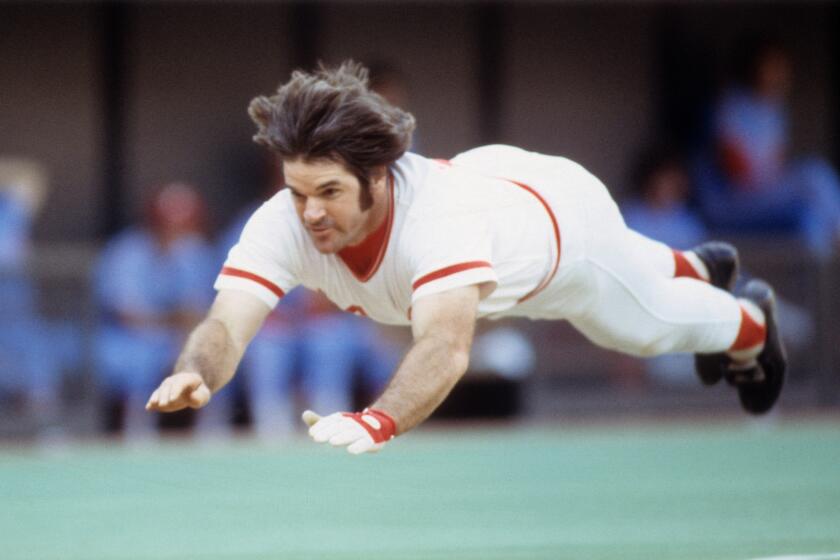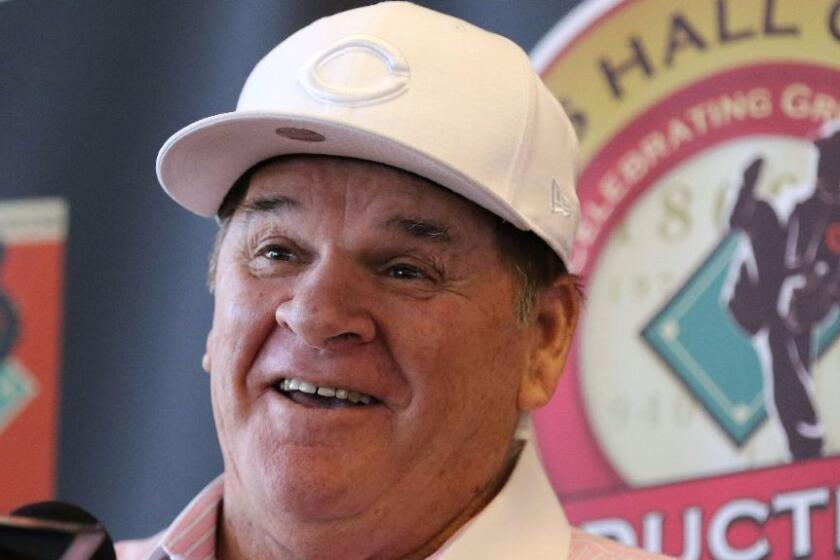Opinion: We all made the Pete Rose tragedy possible

- Share via
In Pete Rose’s old neighborhood on the West Side of Cincinnati, kids were taught to look both ways when crossing U.S. 50, to be home by supper, to fight for everything in life and to never speak ill of the dead.
Rose — Major League Baseball’s all-time hit leader and most notorious gambler — learned these lessons well. Even after he became a baseball pariah, banished to the hinterlands of his sport for betting on his own team and sabotaging himself again and again, Rose rarely dished dirt on other players and refused to insult A. Bartlett Giamatti, the commissioner who oversaw his 1989 ouster and died of a heart attack eight days later.
“I like Bart Giamatti,” Rose told me once. “He was an honest guy. And a good league president. A good commissioner.” Rose wanted me to know that if I wanted him to attack the man who had overseen the end of his career, I was going to be waiting a long time.
With Rose’s death this week at 83, the moment calls for us to break the West Side code. We must reckon with his complicated legacy, tally the cost of his mistakes and lies. And we must acknowledge the uncomfortable reality that we — the sports media, the fans, the culture — helped make the tragedy of Pete Rose possible.
Pete Rose, the Cincinnati Reds legend and baseball’s all-time hits leader who was banished from baseball for betting on the sport, has died at the age of 83.
Rose was, from the beginning, a deeply flawed person, prone to narcissism and excess. As a young man, he was never the best player, but driven by an overbearing father, he acted as if he were. He swaggered through high school, told teammates he was great, and in the minor leagues in the early 1960s, he infuriated other players by appearing to try too hard. They didn’t like that he sprinted to first base on a walk or slid headfirst into bases. And they really didn’t like it when Rose jumped the line, passing over more established players to become the starting second baseman for the Cincinnati Reds in 1963.
It could have ended there; Rose wasn’t yet a great ballplayer. But he refused to squander his opportunity. He worked hard, studied pitchers and hitting, and somehow he became more than the sum of his parts. Rose became our most ordinary extraordinary athlete — and sportswriters loved him for it.
They were almost all white, male and working-class, just like him. Female reporters wouldn’t even be allowed inside major league locker rooms until 1978. And in this de facto white boys’ club, Rose became a god; he became Charlie Hustle. Sportswriters celebrated him for his grit and determination and happily ignored his obvious flaws: his womanizing, his gambling and his apparent addiction to both.
Breezy marketing from DraftKings and similar companies is the modern equivalent of the Marlboro Man. But there’s more corruption in betting than there was in tobacco.
It was an easy choice for the writers. Rose was charming, loved to talk about baseball and always made light of any concerns about his propensity to get down a bet. He admitted being addicted to gambling only later, and only when it served him. The first time was in 1990, when he was seeking leniency in his federal sentencing for tax evasion, and he acknowledged it again in 2004, when he published a shallow, self-serving memoir that he hoped would get him reinstated to baseball.
In reality, Rose was horribly addicted in ways he’d never truly acknowledge. He couldn’t stop gambling. Many people knew it — journalists, Major League Baseball officials, the Reds’ management, his friends, even ordinary fans — and in the end they all just watched him fall.
In the days, weeks, months and maybe years to come, there will be many debates about whether Rose should finally be reinstated and placed on the ballot for induction into the National Baseball Hall of Fame. Many have long speculated that this would come after his death, after he was gone. And it’s a debate worth having. These conversations reveal a lot about us and raise important questions.
What are we celebrating at a Hall of Fame? Are we honoring players for the lives they lived, the choices they made, or for the games they played, the statistics they compiled? And if we are making moral judgments about players, where do we draw the lines? Many bad actors are already enshrined at Cooperstown. Things get messy when we start lionizing anyone, perhaps especially young men who were just good at playing a child’s game.
As the Cincinnati Reds prepare to dedicate a statue to Pete Rose this weekend, the Hall of Fame has affirmed its prohibition on banned players.
But the more interesting debate is about our complicity in creating Rose. Because while he is gone, we are still here and prone to making the same mistakes in a world where there are fewer reporters in the locker room, new barriers to media access to players and widespread risks that Rose never faced, such as legalized sports gambling on our phones.
Today the leagues want us to place our bets — during the next commercial break, as soon as possible and as often as we can. They make money from licensing deals and profit from the engagement that sports gambling creates. But no one wants to discuss the reality. No one wants to admit the truth. The next Pete Rose is out there right now, and we are almost certainly cheering for him, just as we once cheered for Charlie Hustle.
Keith O’Brien grew up in Cincinnati and is the author, most recently, of “Charlie Hustle: The Rise and Fall of Pete Rose and the Last Glory Days of Baseball.”
More to Read
A cure for the common opinion
Get thought-provoking perspectives with our weekly newsletter.
You may occasionally receive promotional content from the Los Angeles Times.













